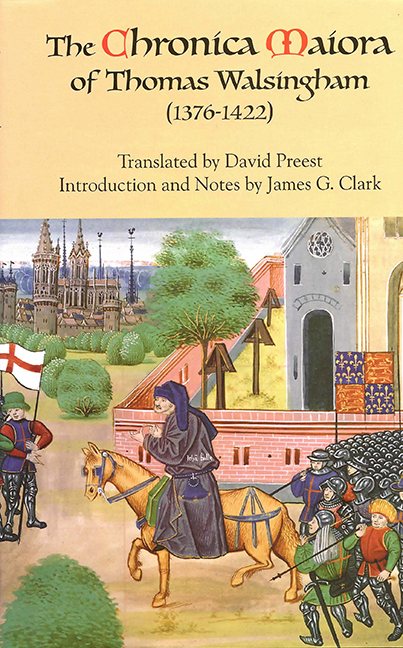The Reign of King Richard II
from The Chronica Maiora 1376–1422
Published online by Cambridge University Press: 24 October 2017
Summary
The Londoners invite the future king to come to London
In 1377, upon the news of the death of King Edward III on 21 June, which was the eve of the feast of St Alban, first martyr of the English [22 June], the citizens of London sent some of their more prominent members to Kennington, where both the prince and his mother the princess were then staying, to pay the respects of the city and citizens of London to them. John Philipot, a citizen of London, who had been chosen to speak on behalf of his fellow citizens, made the following speech:
‘Our news, your excellency, is such that we cannot bring it without great sadness. For there is no doubt that death is at hand for our invincible king Edward, who, I might say, has governed and ruled us and this kingdom for many decades in unbroken peace, and who now, with the signs of death clear upon him, ceases to be our ruler. So on behalf of the citizens and city of London we ask that you, our next king and the only one we recognise as king, will show your highness's approval of your city, which is your chamber. We shall be subject to the commands and directed by the decisions of you alone, in obedience to your lordship and as servants of your person and your words. And, so that we may make the other pronouncements required of our embassy, your highness should know that your city is distressed beyond words that you have long withdrawn your presence from the city which is known to be so devoted to you that it is ready on your behalf to give up not only its possessions but also, if necessary, its life. So we come before you to make our prayer that you may be willing to stay among us, as a comfort for the citizens as well as for your own safety and solace.We also beseech you, most illustrious prince, to agree to put an end to the discord which the quarrels of certain people have recently caused to arise between our citizens and our lord, the duke of Lancaster, and which has brought losses to many and gain to nobody. Such a settlement would be profitable both for the duke himself and for our citizens.’
- Type
- Chapter
- Information
- The Chronica Maiora of Thomas Walsingham (1376–1422) , pp. 34 - 311Publisher: Boydell & BrewerPrint publication year: 2005

